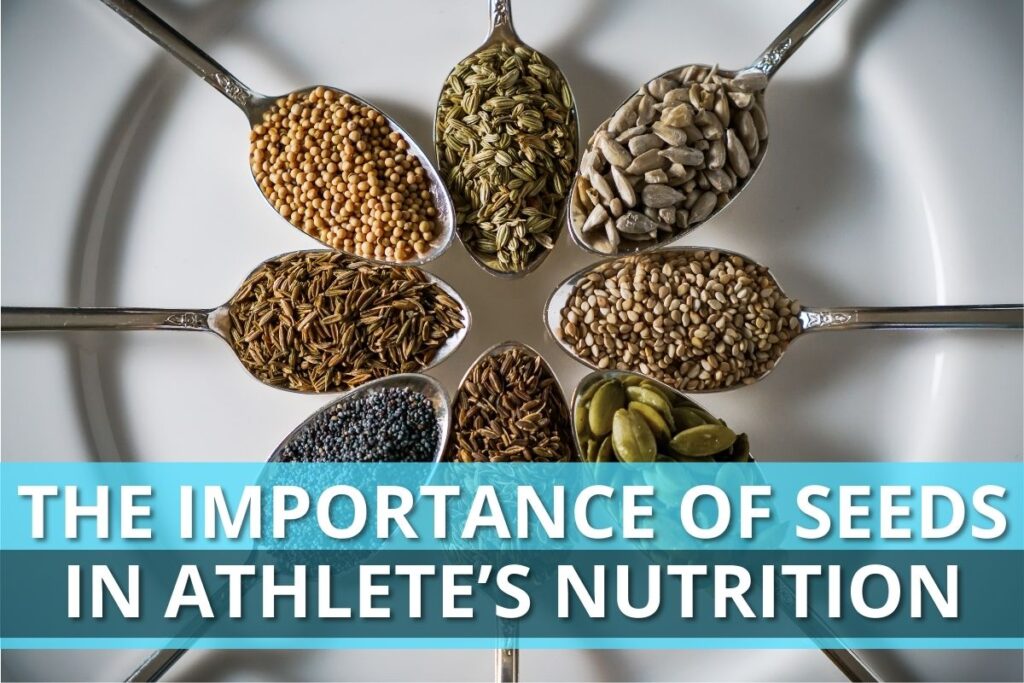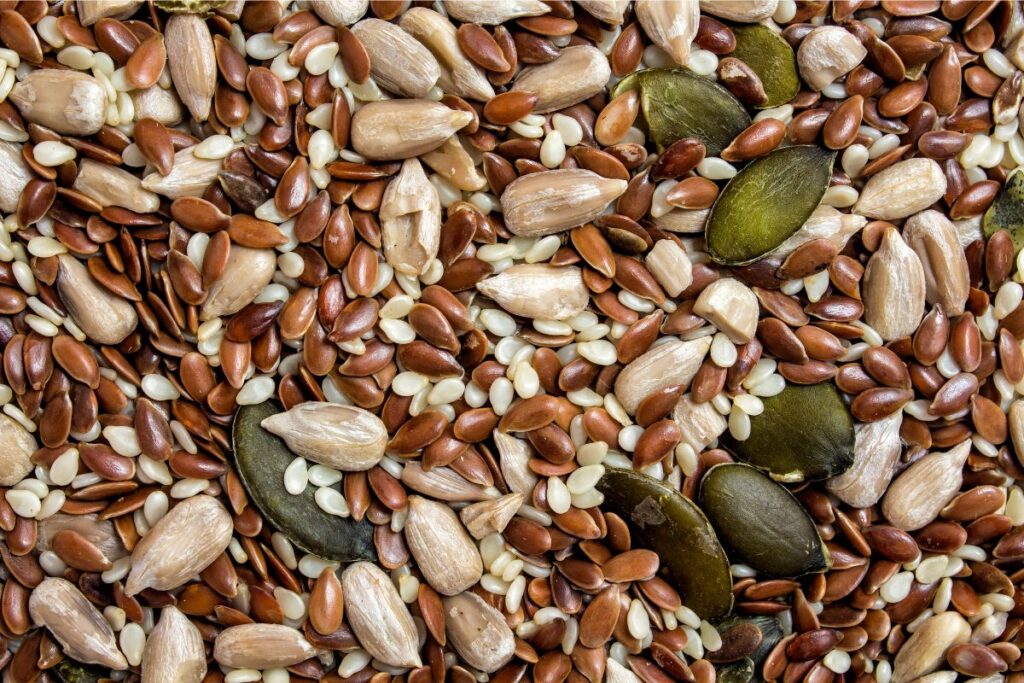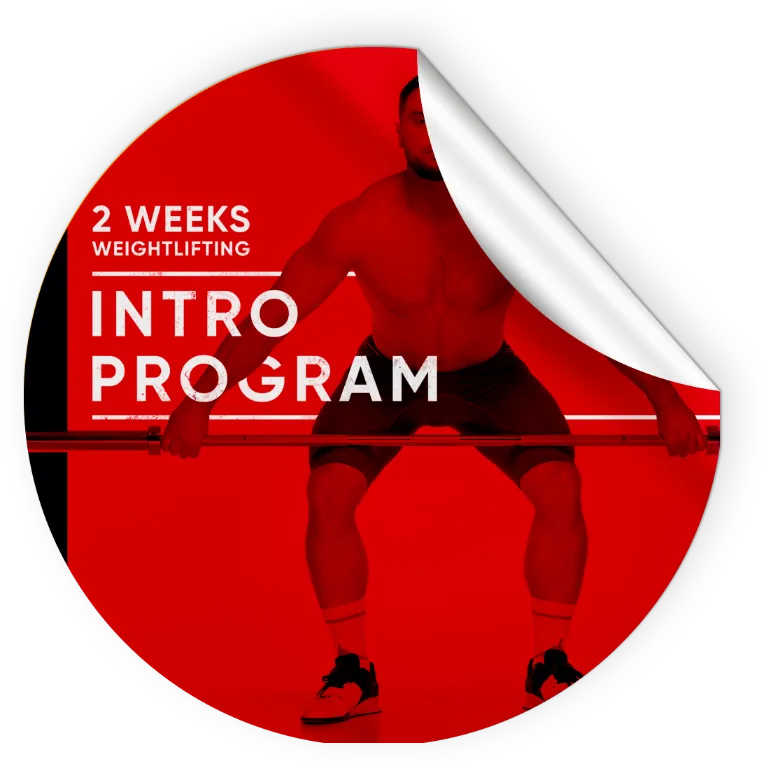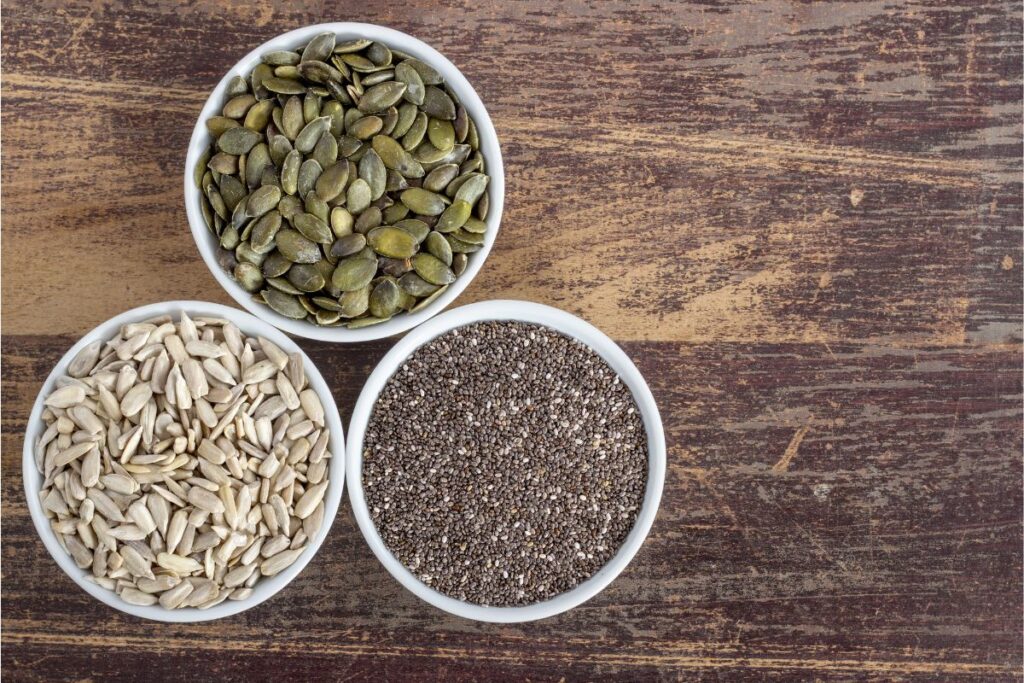The Importance of Seeds in Athlete’s Nutrition
Author:
Unlock your full potential by engaging with our experts and community! Have questions about your fitness journey or looking for expert advice on weightlifting techniques? Don’t hesitate — leave a comment below and Sergii Putsov will provide a personalized answer and insights to help you reach your goals.
Torokhtiy is reader-supported. Some links are affiliate links, and we may earn a commission at no extra cost to you. See our disclosure page for details.
Seeds – is a healthy product, that we get from herbaceous plants. This is a fairly diverse subgroup of foods, with the most popular: pumpkin seeds, sunflower seeds, as well as flax, chia and sesame seeds. In this article, I’ll show you how seeds are good for us weightlifters.
Calories, Proteins, Fats, and Carbs
Seeds (as well as nuts) are very high in calories, as they give us about 500-630 kcal per 100 g of product, and the most high-calorie seeds are unroasted sesame seeds (631 kcal per 100 g), fried sesame seeds (567 kcal), fried sunflower and pumpkin seeds (582 kcal and 559 kcal). Flax and chia seeds are lower in calories: 534 kcal and 486 kcal per 100 g, respectively.

Seeds are good sources of protein, they contain 5 to 9 g of protein in a portion of 30 g. A good bonus for weightlifters who need a lot of protein. Most of the protein is found in pumpkin seeds. The same portion (30 g) contains 3 to 12 grams of carbohydrates. But there is much more fat in seeds than protein and carbohydrates – an average of 14-15 g per 30 g portion.
By the way, flax and chia seeds are good sources of alpha-linolenic acid (one of the omega-3s). Our body receives a small amount of the most active and beneficial omega-3s acids (EPA and DHA) from it.
You may like it:
But remember, that the best sources of these acids are fatty fish from cold waters: mackerel, herring, and the salmon family. For vegetarians, who don’t eat fish, these fatty acids can be obtained from microalgae-based supplements.
Seeds are a storehouse of vitamins and minerals
The seeds contain B vitamins (except B12), as well as a bit of vitamin E and K. Champions in vitamin E content, are sunflower seeds, as a 30 g portion contains almost 8 mg of vitamin, which is more than half of the daily requirement dose (15 mg).
Let me remind you, that vitamin E is a precursor of steroid hormones, one of which is testosterone, which is so important for athletes. Lack of vitamin E can lead to damage to nerve and muscle cells, which leads to muscle weakness. Also, sunflower seeds contain a lot of vitamin B5, which, like vitamin E, is involved in the production of steroid hormones.
Flax seeds contain more vitamin B1 than other seeds. This vitamin is actively involved in the conversion of ATP from carbohydrates, and is also involved in the transmission of nerve impulses and muscle contraction.

The seeds are especially rich in minerals. Even a small 30g portion is high in potassium, selenium, copper, manganese and phosphorus. And certain types of seeds are excellent sources of magnesium (pumpkin seeds, sesame seeds, flax, chia), iron (pumpkin seeds, sesame seeds, flax seeds, chia seeds), calcium (chia seeds and flax seeds) and zinc (pumpkin seeds, sesame seeds).
Calcium, magnesium and potassium are essential for muscle contraction, iron is essential for energy production, and zinc is essential for protein synthesis. By the way, severe zinc deficiency can lead to hypogonadism, a condition in which a man produces little testosterone. Note to athletes – the most zinc is found in sesame and pumpkin seeds.
The advantages and disadvantages of seeds
The high-calorie content of seeds is an advantage for some of us, but a disadvantage for others. If you have difficulty gaining weight and appetite, seeds can help out. As I already mentioned, a portion of seeds is about 30 g, and according to modern recommendations, you can eat 1-2 portions per day, that is, from 30 to 60 grams. On average, the calorie content is 150-170 kcal per 1 serving.
For those who have difficulties gaining weight, 2 servings of seeds per day will help you to get 300-350 kcal, as well as a noticeable amount of protein (10-20 g) and a lot of fat (28-30 g). But if you want to reduce the percentage of fat and this is achieving with difficulty, then you need to be careful with seeds.
Follow us!

Free!
Get a 2-week Weightlifting Program as a bonus for the subscription to kickstart your training plan!

Free!
When is it better to eat seeds
The seeds are high in fiber, which is good for both keeping you full and our health. The clear leaders are chia seeds (as much as 10 g of fiber in a 30 g serving) and flax (8 g), followed by sesame and sunflower seeds (3.5 g each), then pumpkin seeds (2 g).
On the other hand, high amounts of fiber and fat are not the best combination for a pre-workout meal or snack. Fats and fiber slow down the digestive process and this can be bad for your well-being during exercising. One may feel sick, while the other will develop bloating and discomfort in the intestines. Therefore, I consider the best time for eating seeds is either 3-4 or more hours before training, or after it.

For example, if you workout in the afternoon, you can eat seeds with breakfast, and if you workout in the evening, then you can eat the seeds during breakfast, afternoon snacks, and lunch.
If you want to include nuts in your pre-workout meal, there should be approximately 3 hours between meal and workout. Everything is individual, so you can experiment and select a regime in which you will not experience discomfort during training.
What else is important to know about seeds?
It is better to eat flax seeds ground, as they are easier to digest. Whole flax seeds can leave your intestines undigested, which means you won’t absorb the nutrients.
As for chia seeds, if you cook them with liquid dishes, you do not need to grind them, because under the influence of moisture, the delicate surface of chia seeds is destroyed and they are well digested (unlike flax seeds). If you eat chia seeds separately, dry – in this case, it is better to grind them. By the way, it is recommended to drink any seeds with plenty of water (especially flax seeds).
It is also worth remembering about such a phenomenon as intolerance and individual reaction to seeds. Watch your well-being, as some people cannot eat seeds at all, because after eating them, there is bloating and heaviness in the stomach.
Buy any kind of seeds without salt, consume them at least several times a week, stay healthy and strong!
Also Read:
Strength Training and Vitamin C
All You Need to Know About Nuts
You might be interested in:
Why Trust Us?
With over 20 years in Olympic weightlifting, strength training, nutrition coaching, and general fitness our team does its best to provide the audience with ultimate support and meet the needs and requirements of advanced athletes and professional lifters, as well as people who strive to open new opportunities and develop their physical capabilities with us.
By trusting the recommendations of our certified experts in coaching, nutrition, and sports training programming, as well as scientific consultants, and physiotherapists, we provide you with thorough, well-considered, and scientifically proven content. All the information given in the articles concerning workout programming, separate exercises, and athletic performance, in general, is based on verified data.
The product testing process is described in more detail here.
Author: Sergii Putsov
Head of Sport Science, PhD
Best Results: Snatch – 165 kg,
C&J – 200 kg
Sergii Putsov, Ph.D., is a former professional weightlifter and National team member, achieving multiple medals in the 94 kg weight category at national competitions. With a Master’s degree in “Olympic & Professional Sport Training” and a Sport Science Ph.D. from the International Olympic Academy, Greece, Sergii now leads as the Head of Sport Science. He specializes in designing training programs, writing insightful blog articles, providing live commentary at international weightlifting events, and conducting educational seminars worldwide alongside Olympic weightlifting expert Oleksiy Torokhtiy.




Still have questions after reading our article? Unlock your full potential by engaging with our experts and community! Don’t hesitate — leave a comment below and Sergii Putsov will provide a personalized answer and insights to help you reach your goals.